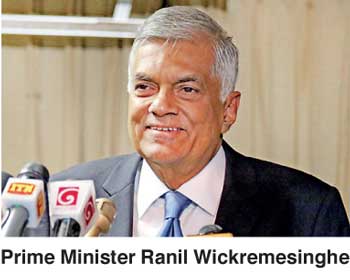Monday Feb 16, 2026
Monday Feb 16, 2026
Tuesday, 6 March 2018 00:50 - - {{hitsCtrl.values.hits}}
 By Skandha Gunasekara
By Skandha Gunasekara
In a bid to win over liberalisation sceptics, Prime Minister Ranil Wickremesinghe yesterday highlighted the importance of bilateral trade, underpinned by unity and stability in the country.
Addressing the Organisation of Professionals Association, under the theme ‘Future of Sri Lanka’, the Prime Minister stressed the need for unity in and stability in Sri Lankan society.
“The civil war that took longer than three decades to conclude took an immense toll on the country’s economy. The war is over but we still haven’t achieved unity. There is no single formula for unity. What worked in the US may not work in Sri Lanka but it is achievable. Look at our neighbour India, even with its diverse communities it is united; it is a modern wonder. Unity is a process,” he said adding that unity will help build a stable nation.
Noting the importance of Sri Lanka’s location in the Indian Ocean, the Premier asserted that free trade agreements and bilateral trade would be crucial for Sri Lanka’s future. “The Indian Ocean and the Bay of Bengal are becoming more important each year and given our location we must exploit that. Our economy should become more and more competitive because we have a market of 3 billion people. That’s the challenge for our economy. We are an important part of India’s Neighbourhood First policy, we are an important part of Japan’s maritime policy and we are also an important partner of China’s One Belt One Road initiative. Our economy should become more and more competitive because we have a market of 3 billion people. That’s the challenge for our economy.”
Although SAARC was unsuccessful in regional integration, the Prime Minister pointed out that countries in East Asia and beyond were ready to trade with Sri Lanka. “Trade agreements are the beginning. We must engage with our immediate neighbours as well as those further away to develop. SAARC has not been successful in this sense, but ASEAN, China, India, Australia, New Zealand are markets we can tap into. We have a free trade agreement with China, one of the only countries in the world to have such a deal.”
The Prime Minister then affirmed that FDIs were key to Sri Lanka’s economic growth in light of the heavy debt burden the country has borne. “Debt servicing is taking the bulk of our revenue. This is why we need FDI’s. We need their technology and their market expertise. That is the only way forward. Immediate challenge is to manage economy and then turn it around,” he said.
Furthermore, the Prime Minister said that the Government may have to look at establishing a land route with India in the future. “India is already looking at setting up land routes from Bangladesh all the way to Thailand. We already have strong and steady maritime routes. Now we may need to look at establishing a land route with India to better our trade relations.”
He went on to say that Sri Lanka had a long way to go in developing the local tourism industry. “There are big opportunities in tourism. Tourism is growing. The largest number of tourists will come from India and China. There are hundreds of millions of people travelling the world. How do we exploit that? How do we attract more tourists from Europe? Australia? That’s a good industry for us. That’s a good sector for us but we have only dipped our toe into it.”
He went on to say that Sri Lanka’s education system needed change, particularly teacher training. “The problem of the school system is rote learning. So let’s move out of the rote learning and then start adjusting it. We must look at our post-school institutions. Post-school institutions are flexible and react to the demands of the market. We must look at these institutions and the transformation our economy has to make. Larger numbers will have to go in for vocational skills and technical training. My view is to first focus on this section and then sort out the school system. In the meantime, within the school system, you train your teachers. Let them do their postgraduate in education. That is the route that can take you away from rote learning. How we move out of that is the challenge,” the Premier said.